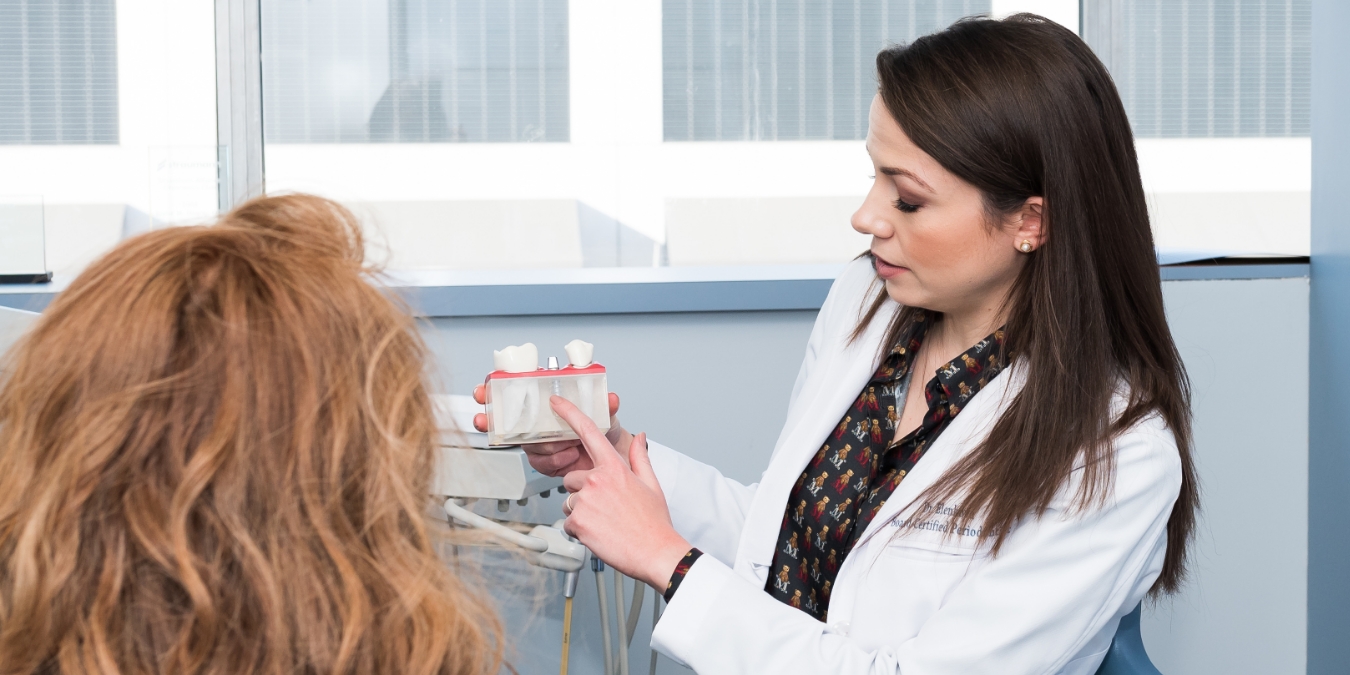
Dental implants offer a longer-lasting and more durable bridge between two teeth than traditional dentures, but they also provide a natural esthetic that blends in with your existing teeth. However, like any other part of the mouth, taking care of them is essential. Otherwise, you may experience peri-implantitis– a condition caused by bacteria building up around your implants that can cause bone loss around your implant(s). To avoid this, it is important to understand what peri-implantitis is as well as how your periodontist can help prevent or treat it. In Burbank, California, the doctors at Burbank Periodontics are experienced in diagnosing and treating gum diseases, including peri-implantitis.
What Is Peri-Implantitis?
Peri-implantitis is advanced stage peri-implant disease, an inflammatory condition affecting the gums around dental implants that can spread to the bone as it progresses. Peri-implantitis inflames the gums and spreads to and deteriorates the bone. Untreated peri-implantitis can lead to dental implant failure.
Although you cannot get an infection in a dental implant, the gum and bone surrounding an implant are living tissue susceptible to bacteria, disease, and infection. Peri-implantitis can threaten oral health and increase the risk of losing a dental implant.
Do I Have Peri-Implantitis?
Verifying whether you have peri-implantitis requires the skill of a periodontist. One of our doctors at Burbank Periodontics can examine your dental implants and the gum and bone around them. Your doctor may perform a cone beam CT scan to identify areas of bone deterioration.
Peri-implantitis signs and symptoms include:
- Red or tender gums around the implants
- Swollen gum tissue
- Gum recession around dental implants
- Discomfort or bleeding while flossing or brushing
- Increased probing depth of the periodontal pockets around dental implants
- Dental implant screw exposure
If you have signs or symptoms of peri-implantitis, promptly schedule an appointment for an exam, accurate diagnosis, and treatment. Immediate care can prevent further complications and dental implant failure.
What Causes Peri-Implantitis?
A buildup of bacteria below the gumline can irritate and inflame gum tissue and lead to peri-implant disease. As gum tissue deteriorates, it damages the bone. Habits such as grinding and clenching can worsen the problem.
Lack of oral hygiene causes plaque buildup between the teeth and gums. The plaque hardens into tartar on dental implants, and toxic bacteria from tartar irritate the gums, causing tissue and bone loss. According to the American Academy of Periodontology, other peri-implantitis risk factors may include smoking, diabetes, and a history of periodontal disease.
How Is Peri-Implantitis Treated?
Peri-implantitis treatment depends on several factors, including the extent of bone loss and the esthetic effects on the dental implants. Less severe cases may respond to non-surgical therapy that controls the infection, antibiotics, and decontamination of the dental implant components.
When peri-implantitis leads to bone loss, the condition may require surgery to remove the infection from tissues and bone, decontaminate the dental implant components, and regenerate lost bone tissue.
No patient cases are identical, so one of our doctors will customize a treatment plan based on the severity of peri-implantitis and how it has affected the gums and bone.
How Do I Prevent Peri-Implantitis?
You can prevent peri-implantitis by practicing diligent oral hygiene at home, including daily flossing between your teeth. You may need to wear a night guard, which is an appliance that protects teeth and implants from grinding/clenching forces. Routine dental exams and cleanings help your dental hygienist detect and remove plaque and tartar below the gumline. If plaque hardens into tartar, only a dental hygienist’s instruments can remove it.
As you floss and brush your teeth, be alert to signs and symptoms of peri-implantitis, including gum swelling, bleeding, and irritation. Promptly schedule an appointment for an exam if you have symptoms or see signs of disease that can threaten your oral health and dental implants.
Get the Treatment You Need for Dental Implant Disease
You can protect your oral health from dental disease. Contact us at Burbank Periodontics to schedule a consultation or exam for early detection and an accurate diagnosis at (818) 842-6162. Your prompt attention and treatment from one of our doctors can prevent the condition from spreading and preserve your dental implants.







